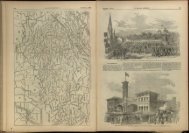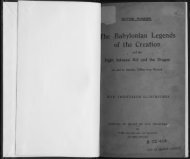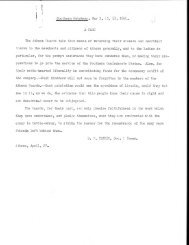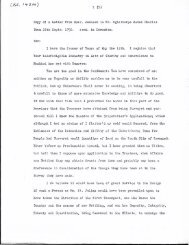THE SHE KING; OR, THE BOOK OF ANCIENT POETRY
THE SHE KING; OR, THE BOOK OF ANCIENT POETRY
THE SHE KING; OR, THE BOOK OF ANCIENT POETRY
You also want an ePaper? Increase the reach of your titles
YUMPU automatically turns print PDFs into web optimized ePapers that Google loves.
76 <strong>THE</strong> <strong>BOOK</strong> <strong>OF</strong> <strong>POETRY</strong>. [PART I.<br />
<strong>BOOK</strong> HI.<br />
<strong>THE</strong> ODES <strong>OF</strong> PfEI.<br />
<strong>OF</strong> P'ei which gives its name to this Book, and of Tung which gives<br />
its name to the next, we hardly knojr anything. Long before the time of<br />
Confucius, they had become incorporated with the State of Wei ; and it is<br />
universally acknowledged that the odes of Books iii., iv., and v. are odes<br />
of Wei. Why they should he divided into three parts, two of which are<br />
assigned to P'ei and Yung respectively, is a question which has baffled all<br />
the critics.<br />
When king Woo overthrew the dynasty of Shang, the domain of its<br />
kings was divided by him into three portions. That north of their capi<br />
ta] was P'ei ; that south of it was Yung ; and that east of it was Wei.<br />
These were constituted into three principalities ; but who among his ad<br />
herents were invested with P'ei and Yung has not been clearly ascertained.<br />
The marquises of Wei, however, managed in course of time to add them<br />
to their own territory.<br />
The first marquis of Wei was K'ang-shuh, a brother of Woo, of whose<br />
investiture we have an account in the Book of History. The first capital<br />
of the State was on the north of the Ho, to the east of Ch'aou-ko, the old<br />
capital of Shang. There it continued till B.C. 659, when the State was<br />
nearly extinguished by some northern hordes, and duke Tae removed<br />
across the river to Ts'aou ; but in a couple of years, his successor, duke<br />
Wan, removed again to Ts'oo-K'ew,—in the present district of Shing-woo,<br />
department of Ts'aou-chow, Shan-tung.<br />
I,<br />
The Pih climv ; mostly narrative. AN <strong>OF</strong>FICES <strong>OF</strong> W<strong>OR</strong>TH BEWAILS<br />
<strong>THE</strong> NEGLECT AKD CONTEMPT WITH WHICH HE WAS TREATED. ,<br />
Such is the view taken of the piece by Maou, who refers it to the time<br />
of duke K'ing, B.C. 866—854. Choo He contends against him that we<br />
have in it the complaint of Chwang Keang, the wife of one of the mar<br />
quises of Wei, because of the neglect with which she was treated by her<br />
husband. Mencius, however, VII. ii. XIX., sanctions the view of the<br />
piece which regards it as the complaint of a worthy officer, neglected by<br />
his ruler, and treated with contempt by a host of mean creatures.<br />
1 It floats about, that boat of cypress wood,<br />
Now here, now there, as by the current borne.<br />
Nor rest nor sleep comes in my troubled mood;<br />
I suffer as when painful wound has torn<br />
The shrinking body. Thus I dwell forlorn,<br />
BE III. i.] <strong>THE</strong> <strong>BOOK</strong> <strong>OF</strong> <strong>POETRY</strong>. 77<br />
And aimless muse, my thoughts of sorrow full.<br />
I might with wine refresh my spirit worn;<br />
I might go forth, and, sauntering try to cool<br />
The fever of my heart; but grief holds sullen rule.<br />
2 My mind resembles not a mirror plate,<br />
Reflecting all th' impressions it receives.<br />
The good I love, the bad regard with hate;<br />
I only cherish whom my heart believes.<br />
Colleagues I have, but yet my spirit grieves,<br />
That on their honour I cannot depend.<br />
I speak, but my complaint no influence leaves<br />
Upon their hearts; with mine no feelings blend;<br />
With me in anger they, and fierce disdain contend.<br />
3 My mind is fixed, and cannot, like a stone,<br />
Be turned at will indifferently abont;<br />
And what I think, to that, and that alone,<br />
I utterance give, alike within, without;<br />
Nor can like mat be rolled and carried out.<br />
With dignity, in presence of them all,<br />
My conduct marked, my goodness who shall scout ?<br />
My foes I boldly challenge, great and small,<br />
If there be aught in me they can in question call.<br />
4 How full of trouble is my anxious heart!<br />
With hate the blatant herd of creatures mean<br />
Ceaseless pursue. Of their attacks the smart<br />
Keeps my mind iu distress. Their venomed spleen<br />
Aye vents itself; and with insulting mien<br />
They vex my soul; and no one on my side<br />
A word will speak. Silent, alone, unseen,<br />
I think of my sad case; then opening wide<br />
My eyes, as if from sleep, I beat my breast, sore-tried.<br />
5 Thy disk, 0 sun, should ever be complete,<br />
While thine, 0 changing moon, doth wax and wane.<br />
But now our sun hath waned, weak and effete,<br />
And moons are ever full. My heart with pain<br />
Is firmly bonnd, and held in sorrow's chain,<br />
As to the body cleaves an unwashed dress.<br />
Silent I think of my sad case; in vain<br />
I try to find relief from my distress.<br />
Would I had wings to fly where ills no longer press!








